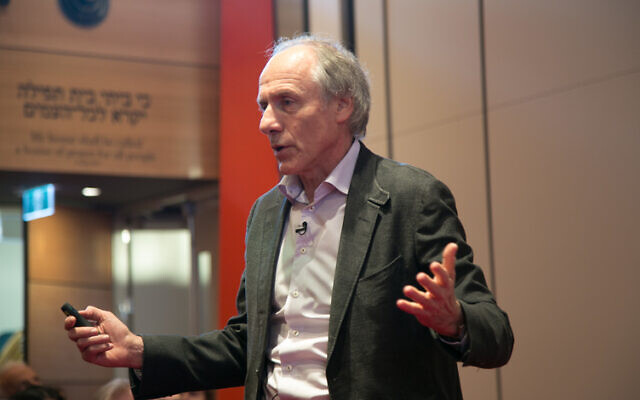‘No country’s done better’ on COVID-19
Chief Scientist Dr Alan Finkel: 'I can’t think of any other OECD country that's done it better … There's no other country I’d rather be living in during this crisis than Australia'
AUSTRALIA is punching above its weight in fighting COVID-19 but we need to have endurance to see the fight out, according to Australia’s Chief Scientist, Dr Alan Finkel.
Finkel, who is spearheading a research corps for Australian government leaders, told The AJN this week, “The spread of COVID-19 has been kept to low levels in Australia through public health measures.
“As yet, there are no treatments or vaccines, so measures such as appropriate physical distancing, diagnostic testing and contact tracing will need to be maintained for some time as we take the steps necessary to bring our economy back to full speed without putting more lives at risk.”
While some nations have academic and formal advisory bodies, the Mount Scopus alumnus, who chairs the recently formed Rapid Research Information Forum (RRIF), said it provides quick, compact, broadly-sourced responses to government leaders’ questions.
“The way in which our governments, that’s the Commonwealth and the state and territory governments, have systematically approached this problem, have taken advice from the medical community, from the Treasury, from the Reserve Bank and collectively – in a collegiate fashion – have dealt with the challenges, I think has been remarkable,” explained Finkel.
“I can’t think of any other OECD country that has done it better … There is no other country that I’d rather be living in during this crisis than Australia.”
The RRIF provides peer-reviewed responses of around 1500 words to leaders. For example, Health Minister Greg Hunt asked how severe the pandemic could become during the Australian winter – lower temperatures and greater humidity can increase its spread, Finkel noted, but physical distancing and other public measures will more than offset this.
Education Minister Dan Tehan wanted to know about different learning outcomes of home schooling and classroom attendance – for students with access to computers and broadband, supportive home environments, and well-prepared and resourced teachers, remote learning can be as effective as classroom education. However, nearly half of Australian school students might not have access to these arrangements.
There have been questions on the timeframe for finding a vaccine, how long the coronavirus can dwell on different surfaces, and how waste-water tests can detect it. And the RRIF is now gathering evidence on how Australians are responding to the COVIDSafe tracking app.
Comprising senior fellows from science, engineering, humanities, social sciences and medical academies, the CSIRO, Science and Technology Australia, the National Science and Technology Council, the Australian Council of Learned Academies, and chief scientists of the states and territories, and New Zealand, the RRIF synthesises “the best available evidence internationally” with responses in five to 10 days, explained Finkel.
As Chief Scientist, Finkel initiated discussions last month with Prime Minister Scott Morrison’s Office, the Department of Prime Minister and Cabinet and the Department of Industry on the need for a nationally coordinated voluntary information bank. Given the go-ahead, he contacted Australia’s top academies and scientific bodies, which are now involved in a process “that I think the government is quite excited to have”.
Finkel said “COVID” was omitted from the RRIF’s title as it hopes to become a longer-term resource beyond the management and recovery phases of the pandemic. “My personal hope is that, based on the useful role that it’s playing, it might be a permanent capability.”
Reflecting on how Judaism inspired his project, Finkel noted, “The single deepest thing I’ve taken from that Jewish tradition is a commitment to integrity.”
On Tuesday, meanwhile, an Israeli government agency confirmed it has isolated an antibody it believes could be used to develop treatments against COVID-19.
Claiming it was ahead of the world in its efforts, the Biological Research Institute cautioned, however, that medication was still several months away.


comments